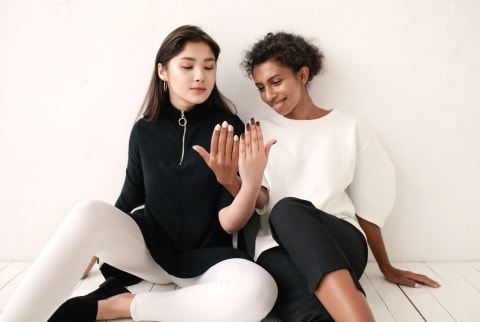Advertisement
Why Compatibility Isn't Always A Good Thing, From A Marriage Therapist


When you think of the idea of romantic compatibility, probably what comes to mind is two people who just fit together perfectly and are likely to make a great couple.
But what many people misunderstand about compatibility, according to one marriage therapist we recently spoke with, is that it's actually not always a good thing.
The dark side of romantic compatibility.
First, let's actually define what we mean when we talk about compatibility: "Compatibility is a natural, effortless way of relating to another person and feeling a connection," licensed couples' therapist Racine Henry, Ph.D., LMFT, recently told mbg. It isn't necessary to be similar to be compatible, she notes, and in fact, compatibility often stems from two people having a mechanism for dealing with conflict in the areas in which they differ.
"Compatibility in a relationship stems from there being a complementary relationship," she explains—but this is also where things get tricky.
According to Henry, just because two people are compatible or have traits that complement each other "doesn't always mean it is a healthy or positive complementarity." Sometimes two people complement each other in ways that may not be in one or both people's best interests.
For example, she says, "There may be someone domineering who finds a partner that is passive." This will probably help the two of them move through conflicts—the domineering person will simply walk over the passive person, who in turn will acquiesce and go along with their partner's decisions. This means the relationship might be able to last—but it doesn't necessarily mean it should.
There are many examples of unhealthy compatibility: Narcissists often seek out echoists, their self-effacing opposites, who they can more easily take advantage of. A person who doesn't give a lot in relationships might do great with someone who doesn't ask for a lot, masking the former's selfishness and the latter's abandonment issues.
What to look for beyond compatibility.
Just because two people click well doesn't mean they're actually a great match, and just because a relationship technically "works" doesn't mean it's healthy. People can be attracted to people for the wrong reasons, and people can sometimes stay in unhealthy relationships just because they're familiar or comfortable. In such situations, "compatibility" isn't doing much for us.
As psychotherapist Ken Page, LCSW, previously told mbg, "We have to grow our capacity to discriminate."
Beyond compatibility, it's important to check to see if the basic building blocks of a healthy relationship are there—things like trust and vulnerability, an equal give-and-take between you, being able to care for yourself and the relationship simultaneously, and a feeling of true safety. And according to relationship therapist Jordan Dann, MFA, L.P., CIRT, a healthy relationship actually requires a healthy dose of differentiation.
Here's a full list of green flags to look for in a relationship. And if you need it, we also have a toxic relationship quiz to help you identify unhealthy patterns.
The takeaway.
While compatibility in terms of personality, values, and lifestyle can all certainly contribute to a sustainable relationship, it's important to recognize that not all compatibility is good compatibility. Sometimes we "click" with someone for the wrong reasons, so we need to be able to look beyond that feeling to see if the relationship is truly serving both people's needs and overall well-being.











